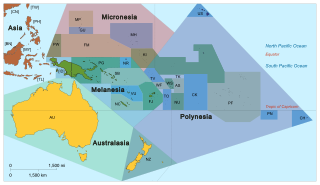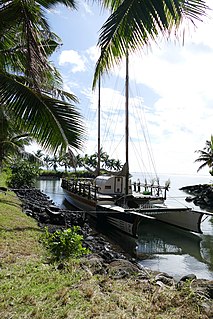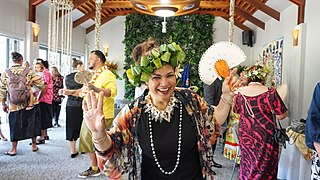
Pacific Islanders, Pacificer, Pasifika, or Pasefika, are the peoples of the Pacific Islands. As an ethnic/racial term, it is used to describe the original peoples—inhabitants and diasporas—of any of the three major subregions of Oceania.
Michael "Michel" Cliff Tuffery is a New Zealand artist of Samoan, Tahitian and Cook Islands descent. He is one of New Zealand's most well known artists and his work is held in many art collections in New Zealand and around the world.

Donna Tusiata Avia is a New Zealand poet and children's author.

Karlo Estelle Mila is a New Zealand writer and poet of Tongan, Pālagi and Samoan descent. Her first collection, Dream Fish Floating, received the NZSA Jessie Mackay Award for Best First Book of Poetry in 2006 at the Montana New Zealand Book Awards. She has subsequently published two further poetry collections, A Well Written Body (2008) and Goddess Muscle (2020), the latter of which was longlisted for the Mary and Peter Biggs Award for Poetry.

The Pacific Music Awards are an annual New Zealand music award ceremony since 2005 that honours excellence in Pacific music in New Zealand. The awards honour musicians who primarily work in the Pacific Island style of music from the Cook Islands, Fiji, Niue, Samoa, Tonga, Tokelau or Tuvalu, and also in urban and gospel genre categories.

The Pacific Media Network is a New Zealand radio network and pan-Pasifika national broadcasting network, currently owned and operated by the National Pacific Radio Trust and partly funded by the Government. It includes the PMN 531 radio network, PMN News and Auckland-only broadcast station PMN NIU combined are accessible to an estimated 92 percent of the country's Pacific population. The network targets both first-generation Pacific migrants and New Zealand-born people with Pacific heritage. As of 2009, it was the only specifically pan-Pacific broadcaster in New Zealand.
Fa'anānā Efeso Collins is a New Zealand politician who is an Auckland Councillor of Samoan and Tokelauan descent. Collins carries the Samoan matai title of Fa’anana from the village of Satufia, Satupaitea, Savai'i.
Courtney Sina Meredith is a poet, playwright, and short story author from New Zealand.

Nina Nawalowalo is a New Zealand theatre director and co-founder of the contemporary Pacific theatre company The Conch.

Moana Pasifika is a rugby union team made up of players from various Pacific island nations as well as New Zealand or Australian born players of Pasifika heritage, including Fiji, Samoa, Tonga and the Cook Islands.

Phylesha Brown-Acton is a Niuean fakafifine LGBTQ+ rights activist. In 2019 she was appointed a Member of the New Zealand Order of Merit in recognition of her work with LGBTQ+ communities from Pacific countries.

Gaualofa is a reconstruction of a va'a-tele, a double-hulled Polynesian voyaging canoe. It was built in 2009 by the Okeanos Foundation for the Sea. It was given to the Samoa Voyaging Society in 2012, on the occasion of Samoa's 50th anniversary of independence. It is used to teach polynesian navigation.
Joana Monolagi is a Fijian artist and masi weaver, whose work is in the collection of Auckland Art Gallery. She was awarded the Creative NZ Pacific Heritage Art Award in 2015, recognising her work in supporting art and culture, her role as Fijian coordinator for the Pasifika Festival, and her own unique artistic practice.

FAFSWAG is an arts collective of Māori and Pacific LGBTQI+ artists and activists founded in Auckland, New Zealand in 2013. They explore and celebrate the unique identity of gender fluid Pacific people and LGBTQI+ communities in multi-disciplinary art forms. In 2020 FAFSWAG was awarded an Arts Laureate from the New Zealand Arts Foundation, and they also represented New Zealand at the Biennale of Sydney.
Cynthia Ta'ala is a sportswoman who has played rugby league for the New Zealand women's national rugby league team and has captained the Samoa women's national rugby union team, of which she is now its assistant coach. She has also played for the New Zealand women's national basketball team.
Kulimoe'anga Stone Maka, is an interdisciplinary artist of Tongan heritage who lives in Christchurch, New Zealand. In 2011, he was awarded the Emerging Pasifika Artist Award from Creative New Zealand. Maka's work has been exhibited in museums and art galleries in New Zealand, Hawai'i Australia and Tonga. In 2020 he was selected to represent New Zealand at the 22nd Biennale in Sydney.
Andy Leleisi’uao is a New Zealand artist of Samoan heritage known for his modern and post-modern Pacific paintings and art. He was paramount winner at the 26th annual Wallace Art Awards in 2017 and awarded a Senior Pacific Artist Award at the Arts Pasifika Awards in 2021.

The Pacifica Mamas Arts and Cultural Trust is an arts collective based in Auckland, New Zealand, with the mission to pass on traditional Pacific arts.

Amanaki Lelei Prescott-Faletau is an actor, writer, dancer, choreographer, producer and director of Tongan descent, living in New Zealand. As a playwright, she became the first fakaleitī to have her work published in New Zealand with Inky Pinky Ponky. This play was awarded Best Teenage Script (2015) by New Zealand Playmarket. As an actor, she was awarded best performance at the 2015 Auckland Fringe Festival for Victor Rodger's Girl on the Corner. Her acting credits include The Breaker Upperers (2018), SIS (2020), The Panthers (2021), The Pact (2021) and Sui Generis (2022), in which she is also a writer for the TV series. Faletau competed as a dancer in the World Hip Hop Dance Championships in 2011 and has been a judge at the National Hip Hop Championships in New Zealand over several years.

Pasifika New Zealanders are a pan-ethnic group of New Zealanders associated with, and descended from, the indigenous peoples of the Polynesian islands outside of New Zealand itself. They form the fourth-largest ethnic grouping in the country, after Asian New Zealanders, indigenous Māori, and European-descended Pākehā. There are over 380,000 Pasifika people in New Zealand, with the majority living in Auckland. 8% of the population of New Zealand identifies as being of Pacific origin.















